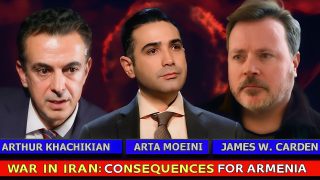Azerbaijan will have to Negotiate with Independent Artsakh: Artur Martirosyan

Interview with Artur Martirosyan of Boston, Senior Consultant, CMPartners, a negotiation specialist.
Mr.Martirosyan, to resume negotiations on Karabakh conflict settlement Serzh Sargsyan, RA president, set forward three conditions: setting up an investigation mechanism for ceasefire agreement violations, concrete assessments of violating parties and guarantees that Azerbaijan won’t undertake such violations. The Azerbaijani MFA commented on this move that it were a withdrawal from the negotiations. Reactions of mediators are not known yet. What’s going on in the backstage? Why do the OSCE MG Co-chairs keep silent?
There is a parable about a frog: if we put the frog into boiling water, it’ll immediately jump out, but if we put the frog in a cold water and heat it up slowly, we may as well boil the frog because it will not notice the boiling moment. This parable is appropriate for our situation. I think that conditions set forward by Serzh Sargsyan are absolutely correct, however, they should have been set out much earlier. Very often we don’t notice how our own behavior and choices contribute to the aggressive actions by the adversary. Should we wait for the sharpening escalation, imposed by the adversary, to make a demarche against an imitation negotiation process? Such a demarche was necessary, when, for instance, Aliyev made Safarov a hero. What may one discuss with Aliyev, who trespasses all the rules and values? Had the Armenian side withdrawn from the process when such behavior was not publicly condemned, we may have not seen the recurrence of gross violations of norms this time around.
We can’t know for sure what’s going on behind the scenes of diplomatic activities as this work enjoys silence, however, we know for sure, that mediating powers, out of their different interests, support the status quo. Moreover, the fragmented escalation doesn’t threaten to their interests, and our calls to human values and rules for waging a war are falling on deaf ears because the international relations discourse on values, unfortunately, has been marginalized. Interests and different types of power from soft to hard are dominant. That’s the reason why we need to shift our perception of the national security dilemma, the red lines and selections of means.
Mediators will become more active, they’ll recall the humanitarian values only when the frame of losses gets tangible for their interests. And it will occur only when our actions speak louder than words. We can’t afford ourselves the game of the war of attrition dictated by the sultanistic regime when we record casualties on the contact line on a daily basis. It’s necessary to change this game and impose on the adversary our own game, which, to a great extent, should satisfy the mediators, again out of their varying, sometimes even contrasting interests, which intersect in one point—they don’t need a large scale war.
If Azerbaijan continues military operations, and the Armenian side shows tough disposition, which is the way out from the deadlock?
The only way to bring the other side to the negotiation table is by a convincing demonstration that their alternative to negotiations – a war of attrition with fragmented escalations is bankrupt, and will lead to considerable losses for their interests and interests of the mediators. Aliyev’s regime is indifferent toward loss of blood, it’s sensitive only towards loss of oil. It is necessary therefore to initiate pre-emptive strikes, not as a reaction to the moves of the adversary, but when our military authorities consider them appropriate.
This means to impose Azerbaijan to return to the negotiation table, the Armenian side should target oil wells.
Targets are chosen by the military. What is critical here is that neither the Azerbaijani side, nor mediator countries, unfortunately, would not stir a finger to establish a new ceasefire regime since due to the current state of affairs their interests haven’t been damaged. Why should they change anything, if it didn’t touch their interests? Only for the fact, that there are values? We can naively consider that Russia, the USA or the EU are guided by values in their foreign policy, however, in that case, losses for us will be inevitable.
Today RA Government will discuss the draft law on recognition of Artsakh Republic. You stated before, that NKR recognition is equal to disruption of negotiations. However, under current reality, when there are no negotiations, and calls on recognition of Artsakh in different platforms are heard, in your opinion won’t NKR recognition by Armenia become an instigation for its wider extension? And won’t NKR recognition by Armenia obstacle the process of recognition by other states?
On the issue of the recognition, I have stated many times that it’s not right to make it into an end in itself, it’s only a means to reach the goal of a secure independent development. It’s also wrong to link the recognition with the actions of the adversary. Logically, this linkage means the recognition is conditioned on activities of the opposing side. We should recognize Artsakh, when there are the necessary prerequisites for it. Presently they are available: there is a high probability, that the completely legitimate conditions the resumptions of negotiations won’t be implemented and mediators can’t enforce Azerbaijan to stick to the earlier commitments, and at that time recognition will be mandatory, and any new format will demand direct participation of Artsakh in negotiations. The current format has exhausted itself. After all, there is Northern Cyprus, recognized by Turkey alone, and it doesn’t hinder negotiations.
Do you consider possible, that after Armenia recognizes Artsakh, other states will recognize it as well? How will it impact on Azerbaijani moods, which already submitting the issue for discussion by RA Government qualifies as disruption of negotiations and suspension of OSCE MG mandate?
This question will be more proper to direct to the ministries of foreign affairs of Armenia and NKR. I’m not sure the recognition process will be followed by an avalanche of recognitions. A more possible scenario is that a few countries will follow Armenia. One thing will be radically changed—negotiations will cease for some period, to be more precisely, until Azerbaijan is convinced that the alternative to negotiations, i.e “a military solution” is unsustainable, while they may satisfy some interests at the negotiation table. From this standpoint, discussion of certain variants for Artsakh’s status or means of defining them will be redundant: Azerbaijan will have to negotiate with independent Artsakh. It’s another issue when and on what conditions this will happen. For this reason, mediators should either undertake measures on establishing a new ceasefire regime, or reconcile with the prospect of a new large scale regional war and imminent losses to their own interests.
Azerbaijan submitted a letter to the UN Security Council on withdrawal of the 1994 trilateral ceasefire agreement. How realistic is that?
I don’t know anything about this, but if so, then this is quasi-diplomacy: the UN has nothing to do with the issue of withdrawal from that agreement. De facto, it’s not the first year, that Azerbaijan has been violating the ceasefire agreement, and on April 2, in fact, it withdrew from that accord entirely. A similar case of a creepy withdrawal from the Versailles system was recorded by Hitler Germany in 1930s. For this reason, mediators, as I already mentioned, should either undertake measures to restore and enforce the ceasefire, or get along with the possibility of a large-scale war.
By Gayane Khachatryan

























